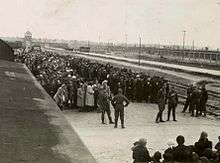Reinhold Hanning
Reinhold Hanning (born 28 December 1921) is a former SS guard at the Auschwitz concentration camp and a convicted war criminal.[1] During World War II, he served for two years with the SS at Auschwitz, after volunteering for the Waffen SS at the age of 18.[2] Hanning was one of the SS men who met Jewish prisoners as they arrived at the camp in Holocaust trains; and escorted them to the gas chambers.[3]
Life
Hanning grew up in Lippe where he attended elementary school. He then worked in a factory. At the age of 14 he joined the Hitler Youth. Five years later he volunteered for the Waffen-SS. Following the onset of World War II, Hanning served with the 2nd SS Panzer Division Das Reich. On 25 July 1940 he joined the SS-Totenkopfverbände and in January 1942 was sent to Auschwitz death camp with the rank of Sturmbannführer. In September 1943 he was promoted to Unterscharführer while at Auschwitz II Birkenau. In June 1944, he was transferred to Sachsenhausen concentration camp. Hanning became a prisoner of war in May 1945. He was released on 20 May 1948. For a short time he worked as a cook for the British forces in Lage (Lippe) and then as a truck driver for a dairy company and as a salesman. In 1964 he went into business for himself, and retired in 1984.[4]

Trial
Hanning was one of some 30 former Auschwitz guards investigated in 2013 by the German federal prosecutors from special office in Ludwigsburg with the recommendation that they pursue charges after the major war crimes policy review. Until 2009, prosecutors were required to prove that an accused Nazi was responsible for killing a victim in order to obtain a conviction. In the trial of John Demjanjuk, the defendant was found guilty even though he didn't directly kill any of his victims, and was convicted of being an accessory to murders.[5]
In 2016, Hanning was convicted of 170,000 counts of being an accessory to murder[6] and sentenced to 5 years in jail. Several Holocaust survivors testified against him during the trial.[7] Hanning apologized, but denied the charges.[3]
References
- ↑ Gray-Detmold, Eliza. "Inside One of the Last Nazi Death Camp Trials". Germany: Time (magazine).
- ↑ "Auschwitz guard sentenced to five years for complicity in 170,000 murders". Deutsche Welle. 17 June 2016.
- 1 2 Jenny Hill (17 June 2016). "Former Auschwitz guard Reinhold Hanning convicted". BBC News. Detmold, Germany.
- ↑ Dirk-Ulrich Brüggemann: Die zwei Gesichter des Reinhold Hanning – eine Annäherung. Neue Westfälische, 8 March 2016, accessed 29 April 2016.
- ↑ "Reinhold Hanning, Auschwitz guard, goes on trial Thursday. Proceedings will be limited to 2 hours per day in deference to Hanning's age". The Associated Press. February 11, 2016.
- ↑ "Defence seeking acquittal of 94-year-old former Auschwitz guard charged as an accessory to 100,000 murders". National Post. Retrieved 2016-11-12.
- ↑ "'I cannot forgive him': Auschwitz survivor confronts Nazi guard on trial for more than 170,000 deaths". National Post. Retrieved 2016-11-12.
